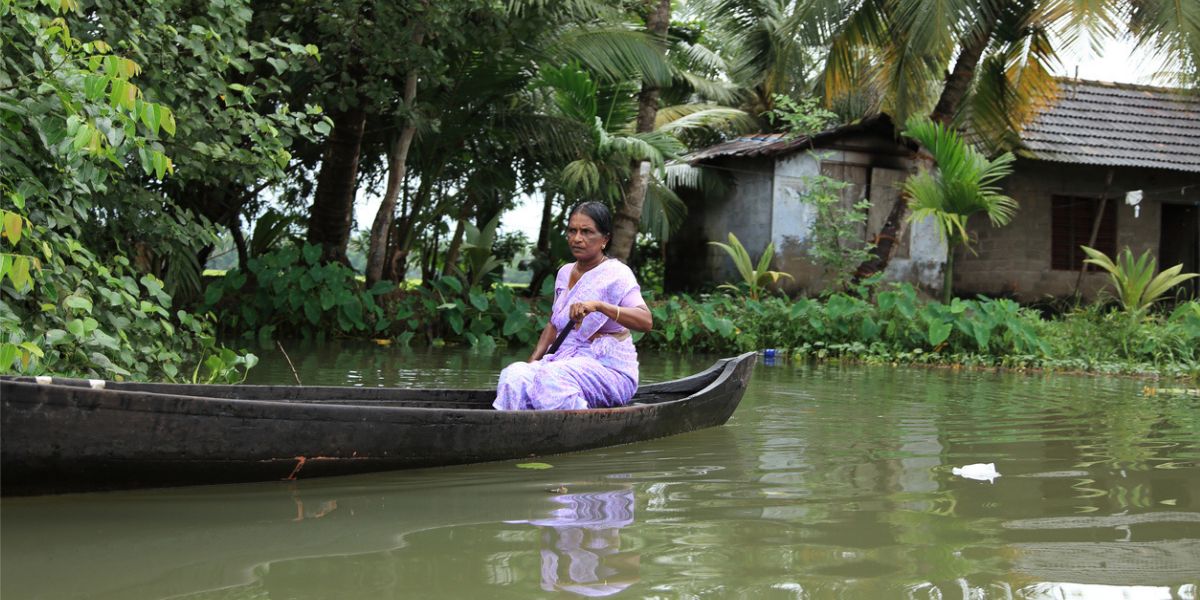Published Jun 15, 2025 | 4:07 PM ⚊ Updated Jun 15, 2025 | 4:07 PM

A woman rowing a small boat in the backwaters of Kerala. (iStock)
Synopsis: The Fisheries Department is rolling out a series of projects aimed at the integrated and sustainable development of fisherwomen in Kerala. Beyond livelihood enhancement, the projects are expected to generate hundreds of new self-employment and indirect job opportunities for fisherwomen across the state.
Kerala is casting a wider net for its fisherwomen. In a bid to uplift the lives of women in the coastal belt, the Fisheries Department is rolling out a series of projects aimed at the integrated and sustainable development.
Moving beyond the shores, these initiatives focus on equipping fisherwomen with skills for alternative livelihoods, strengthening microenterprises, and offering financial support to women fish vendors.
With women comprising over 3.74 lakh of the state’s 10.6 lakh-strong fishing community as of 2023, the move is poised to bring economic resilience and empowerment to a vital yet often overlooked segment of the coastal economy.
In a major boost to Kerala’s coastal microenterprises, the state government is set to roll out a ₹14-crore livelihood project for fisherwomen in 2025-26, with a strong focus on e-commerce and branding.
A key highlight of the initiative is the promotion of products under a unified brand name, alongside strengthening online marketing channels to expand market reach and visibility for fisherwomen-led enterprises.
Titled “Alternative and Supportive Livelihood Opportunity to Fisherwomen of Kerala”, the project will be implemented through the Department of Fisheries in association with the Society for Assistance to Fisherwomen (SAF). It aims to equip coastal women with alternative livelihood skills and opportunities beyond the fishing sector, while ensuring sustainable employment and access to institutional credit.
With over 1,700 microenterprises already operating in areas like fish processing, food production, textiles, supermarkets, and services, the new project targets at least 300 more fisher families initially.
The plan also includes wellness initiatives, skill development workshops, and financial support, with the goal of ensuring a minimum monthly income of ₹10,000 for each beneficiary. The government views this initiative as a vital step towards gender empowerment and socio-economic upliftment in Kerala’s coastal communities.
Aiming to reshape Kerala’s seafood value chain through women-led entrepreneurship, an upcoming ₹756.01 lakh project will establish a network of sales and distribution hubs — both online and offline — along with retail outlets to directly connect fisherwomen collectives with urban consumers.
Titled “Strengthening SAF, Fisherwomen Microenterprises through Collectivisation and Value Chain Development,” the initiative is slated for implementation in 2025-26 under the State Plan Fund through the Department of Fisheries, in collaboration with the Society for Assistance to Fisherwomen (SAF).
The project envisions transforming microenterprises run by fisherwomen into thriving collective ventures seamlessly integrated into organised value chains, tapping into Kerala’s rapidly evolving urban markets. A key highlight is the proposed launch of ‘Kadal Cafés’ — seafood takeaway counters offering fresh, ready-to-cook (RTC) and ready-to-eat (RTE) products prepared by SAF entrepreneurs to meet the growing appetite for convenient, healthy meal options.
The initiative will also strengthen existing enterprises by upgrading infrastructure and operations, leveraging support from central schemes like the Pradhan Mantri Matsya Kisan Samridhi Sah-Yojana (PM-MKSSY).
Beyond livelihood enhancement, the projects are expected to generate hundreds of new self-employment and indirect job opportunities for fisherwomen across the state.
The government has also cleared a project aimed at uplifting the socio-economic conditions of fisherwomen, reducing poverty, and creating more employment opportunities within the fishing sector.
The initiative, which also seeks to foster sustainable livelihoods and equip beneficiaries with financial management skills, involves providing interest subvention for women engaged in fish vending during 2025-26.
With a total outlay of ₹400 lakh, the scheme will be implemented by MATSYAFED, the state’s apex federation for fisheries development.
It targets registered women fish vendors from artisanal fishing families who rely on fish vending for their livelihood, aiming to free them from unserviceable debt and financial exploitation — a long-standing issue in Kerala’s coastal communities.
Officials said the project would help fisherwomen carry out their livelihood activities with greater independence and stability, enabling them to become self-reliant contributors to their communities.
However, speaking to South First, Jackson Pollayil of the Swathanthra Matsya Thozhilali Federation minced no words while criticising the government’s new schemes.
“In most of these programmes, it’s the people with political connections — those close to the ruling front or office bearers of government-backed bodies — who end up reaping the benefits,” alleged Jackson.
He insisted that what the fisher community truly needs are not “grand business ideas,” but basic amenities.
“The fisherwomen we know are not looking to become entrepreneurs overnight. What they want is safe transportation to markets, clean washrooms, and hygienic fish markets. Just visit any market and see how many you can enter without holding your nose,” he remarked.
Jackson added that the government should first focus its attention on improving fundamental infrastructure before pushing flashy projects in the name of empowerment.
On the other hand, the Fisheries Department defended its initiatives, claiming that such programmes are designed to uplift fisherwomen by making them financially independent and reducing their dependence on daily fishing incomes.
“These initiatives aim to enhance living standards and offer alternative livelihood opportunities, especially during non-working days caused by rough weather or other unforeseen disruptions at sea,” stated an official, maintaining that the schemes are a step towards integrated, sustainable development.
(Edited by Muhammed Fazil.)

